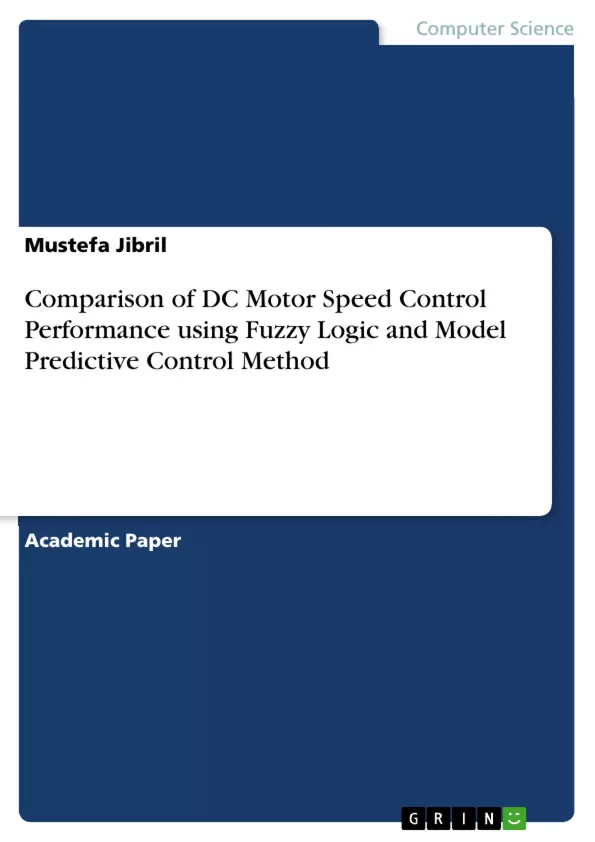The main target of this paper is to control the speed of DC motor by comparing the actual and the desired speed set point. The DC motor is designed using Fuzzy logic and MPC controllers. The comparison is made between the proposed controllers for the control target speed of the DC motor using square and white noise desired input signals with the help of Matlab/Simulink software. It has been realized that the design based on the fuzzy logic controller track the set pointwith the best steady state and transient system behavior than the design with MPC controller. Finally, the comparative simulation result prove the effectiveness of the DC motor with fuzzy logic controller.
Inhaltsverzeichnis (Table of Contents)
- 1. Introduction
- 2. Mathematical model of a DC motor
- 3. Proposed Controllers Design
- 3.1 Fuzzy Logic Control
- 3.11 Input and Output of fuzzy controller
- 3.12 MPC Control
- 3.1 Fuzzy Logic Control
- 4. Result and Discussion
- 4.1 Comparison of Dc Motor with Fuzzy Logic and MPC Controllers for a Square Wave Input Signal
- 4.2 Comparison of Dc Motor with Fuzzy Logic and MPC Controllers for a White Noise Input Signal
- 5. Conclusion
Zielsetzung und Themenschwerpunkte (Objectives and Key Themes)
The main objective of this paper is to control the speed of a DC motor by comparing the actual and desired speed set point. The paper then compares the performance of two control methods, Fuzzy Logic Control (FLC) and Model Predictive Control (MPC), using Matlab/Simulink software.
- Comparison of FLC and MPC for DC motor speed control
- Performance evaluation of DC motor control methods
- Steady state and transient system behavior analysis
- Simulation results and analysis of different input signals (square wave and white noise)
- Effectiveness of fuzzy logic controllers for DC motor speed control
Zusammenfassung der Kapitel (Chapter Summaries)
Chapter 1 provides a general introduction to DC motors and their various applications.
Chapter 2 presents the mathematical model of a DC motor, outlining its torque and electromotive force characteristics. This chapter also includes the derivation of the motor's equations using Newton's laws and Laplace transforms.
Chapter 3 discusses the design of the proposed controllers, Fuzzy Logic Control (FLC) and Model Predictive Control (MPC). It explains the basic principles and implementation of each control method.
Chapter 4 presents the results and discussions based on the simulation of the DC motor using the proposed controllers. This chapter includes the comparison of the system's performance with both a square wave input signal and a white noise input signal.
Schlüsselwörter (Keywords)
The primary focus topics of the text include DC motor speed control, Fuzzy Logic Control, Model Predictive Control, simulation, and performance evaluation. The work utilizes Matlab/Simulink software for the development and analysis of the control systems. Key terms used in the text include DC motor, FLC, MPC, square wave signal, white noise signal, overshoot, settling time, steady state behavior, and transient behavior.
Frequently Asked Questions
What is the main goal of this research paper?
The paper aims to compare the performance of Fuzzy Logic Control (FLC) and Model Predictive Control (MPC) in controlling the speed of a DC motor.
Which controller proved to be more effective for DC motor speed control?
According to the simulation results, the Fuzzy Logic Controller (FLC) showed better steady state and transient system behavior compared to the MPC.
What software was used for the simulations?
The researchers utilized Matlab/Simulink software to design and compare the proposed controllers.
What types of input signals were used in the comparison?
The performance was evaluated using both square wave and white noise desired input signals.
What are the key performance metrics discussed?
Key metrics include settling time, overshoot, steady state behavior, and transient response of the DC motor system.
- Arbeit zitieren
- Mustefa Jibril (Autor:in), 2020, Comparison of DC Motor Speed Control Performance using Fuzzy Logic and Model Predictive Control Method, München, GRIN Verlag, https://www.grin.com/document/542030



